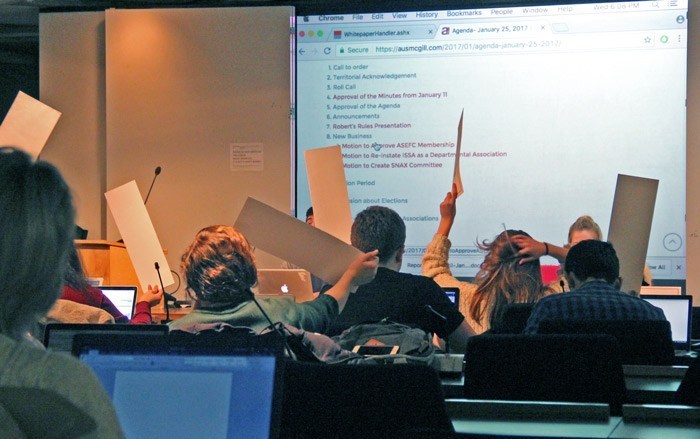In its final Legislative Council meeting of the fall semester, the Arts Undergraduate Society (AUS) held a moderated discussion about an all-expenses paid trip to Israel offered to AUS members by Hillel McGill, a cultural organization for Jewish students on campus.
The trips, which were explicitly targeted to McGill student leaders, are funded by the Maccabee Task Force, an organization that opposes the boycott, divestment and sanctions (BDS) movement against Israel. During the moderated discussion period, many councillors voiced their concern that accepting the trips as a gift would be inappropriate and would present a conflict of interest. Unlike the Students’ Society of McGill University (SSMU), AUS does not currently have a conflict of interest policy.
Two AUS executives, Vice-President (VP) Finance Stefan Suvajac and Arts Representative to SSMU Andrew Chase, have accepted the trips. Arts Representative Adin Chan, who originally accepted the offer, announced to the Legislative Council that he had withdrawn his acceptance of the trip.
During his opening statement, Sujavac explained that he did not see his actions as inappropriate.
“I don’t believe my acceptance of this trip represents an overreach or abuse of my position,” Suvajac said. “[Regarding] the harm that individuals suggest this trip causes to Palestinian students, I don’t think that I can provide a neat answer to that in any meaningful sense. Although I will say, I don’t believe that I represent all students in any meaningful capacity. I don’t think I have that right.”
Dalton Liggett, VP External of the History Students’ Association, argued against student leaders accepting trips from any advocacy group.
“My personal political views on the Israeli-Palestinian conflict are irrelevant to the issue at hand,” Liggett said. “The objective facts of this issue are that elected officials, who are supposed to serve students, accepted a financial gift in the form of trip subsidization from an on-campus interest group [….] Our job is to hold the executive accountable.”
The council moved on to discuss other business, including the suspension of three departmental executives who had not attended mandatory equity training. However, in the last 10 minutes of the meeting, a motion was introduced proposing that AUS release a statement condemning the Hillel McGill trips.
Myriam Driss, VP External of the McGill Environment Students’ Society, explained that the statement would express disappointment with the executives who had accepted the trips.
“We would like to reemphasize to the Palestinian students […] that, even in spite of [the executives’] decision[s], we stand in solidarity with their concerns,” Driss said. “We do not believe that the rules of a policy, in this case, the SSMU Conflict of Interest policy, should [alone] serve as a moral compass [for executives].”
Despite multiple attempts to postpone the motion indefinitely, five minutes after the meeting was adjourned, the motion passed. The statement was sent out to Arts Students in a Listserv two weeks ago.
Flashback:
After debate about whether the AUS executives were selected for the trips based on their influence on campus, Andreas Koch, the VP External of the World Islamic & Middle Eastern Studies Student Association, read out the trip invitation sent out by Hillel McGill word for word. Koch noted that the phrase ‘student leader’ was repeated four times in its first paragraph.
Sound Bite:
“[Palestinians] themselves have a claim to the land. It’s their homeland. Yet they do not have a right to visit their own home. So how [should] random AUS executives not only have the right to go visit Israel or Palestine, but [be able to] go free of charge when people who have their homes there can’t even return there? […] Don’t you think that’s a bit offensive to Palestinian students on campus?” —anonymous gallery member.







